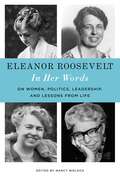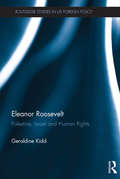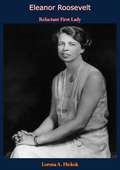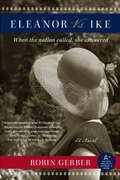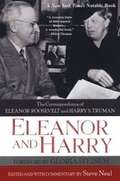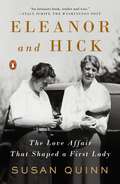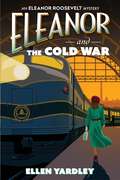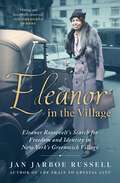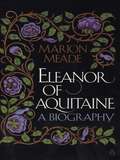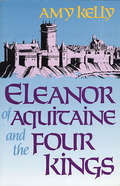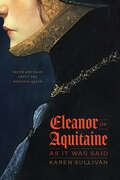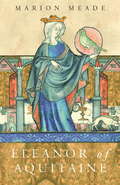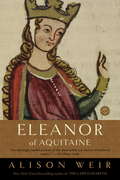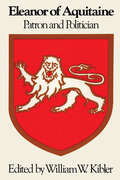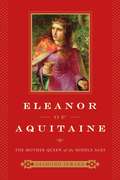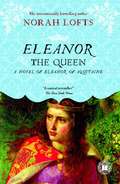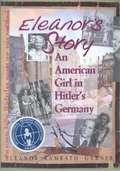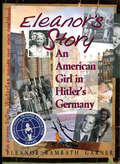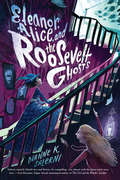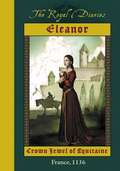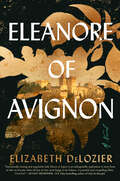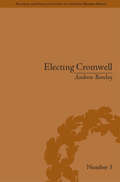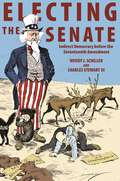- Table View
- List View
Eleanor Roosevelt: On Women, Politics, Leadership, and Lessons from Life
by Nancy WolochThis illustrated, first of its kind collection of excerpts from Eleanor Roosevelt's newspaper columns, radio talks, speeches, and correspondence speaks directly to the challenges we face today.Acclaimed for her roles in politics and diplomacy, first lady Eleanor Roosevelt was also a prolific author, journalist, lecturer, broadcaster, educator, and public personality. Using excerpts from her books, columns, articles, press conferences, speeches, radio talks, and correspondence, Eleanor Roosevelt: In Her Words tracks her contributions from the 1920s, when she entered journalism and public life; through the White House years, when she campaigned for racial justice, the labor movement, and "the forgotten woman;" to the postwar era, when she served at the United Nations and shaped the Universal Declaration of Human Rights. Selections touch on Roosevelt's early entries in women's magazines ("Ten Rules for Success in Marriage"), her insights on women in politics ("Women Must Learn to Play the Game As Men Do"), her commentary on World War II ("What We Are Fighting For"), her work for civil rights ("The Four Equalities"), her clash with Soviet delegates at the UN ("These Same Old Stale Charges"), and her advice literature ("If You Ask Me"). Surprises include her unique preparation for leadership, the skill with which she defied critics and grasped authority, her competitive stance as a professional, and the force of her political messages to modern readers. Scorning the "America First" mindset, Eleanor Roosevelt underlined the interdependence of people and of nations. Eleanor Roosevelt: In Her Words illuminates her achievement as a champion of civil rights, human rights, and democratic ideals.
Eleanor Roosevelt: Palestine, Israel and Human Rights (Routledge Studies in US Foreign Policy)
by Geraldine KiddMemorialised as a US heroine and an iconoclastic humanitarian who sought to protect society’s marginalised, Eleanor Roosevelt also, at times, disappointed contemporaries and biographers with some of her stances. Examining a period of her life that has not been extensively explored, this book challenges the previously held universality of Eleanor Roosevelt’s humanitarianism. The Palestinian question is used as a case study to explore the practical application of her commitment to social justice, and the author argues that, at times, Roosevelt’s humanitarianism was illogical, limited and flawed by pragmatism. New insights are provided into Eleanor Roosevelt’s human rights activism – its dichotomies, its inspiration, and the effect it had on US relations with the Middle East. This book will appeal to academics working across a range of disciplines including history, diplomatic history, American studies, Middle Eastern studies, US foreign policy, human rights and women’s studies.
Eleanor Roosevelt: Reluctant First Lady
by Lorena A. HickokLORENA HICKOK is in a unique position to write the story of Eleanor Roosevelt’s transition from a private individual to First Lady of the land. As a newspaper reporter, she had known Mrs. Roosevelt since Al Smith’s campaign for President, and she was assigned by the Associated Press to cover her during her husband’s presidential campaign in 1932. With this new assignment, the two shortly became, as they have remained, very good friends.The author was at Mrs. Roosevelt’s side throughout the momentous days of the campaign, election and inauguration. A frequent guest at the White House, she witnessed the adjustment of its new mistress to the occupancy of that residence. Together, they took the last trips that Mrs. Roosevelt attempted in a vain effort to preserve her anonymity. Reluctant First Lady gives a fascinating and heart-warming insight into the problems and sacrifices that confront an active private citizen, wife and mother, whose husband becomes President of the United States.
Eleanor Vs. Ike: A Novel
by Robin GerberIt is a time of turmoil, with the nation mired in an unpopular war in Korea and with Senator Joseph McCarthy stirring up fear of a lurking Communist "menace." Racial discrimination is rampant. A woman's place is in the home. And when a shocking act of God eliminates the Democratic presidential nominee, the party throws its support to an unlikely standard bearer: former First Lady and goodwill ambassador to the world Eleanor Roosevelt.Captivating and fast-paced, Eleanor vs. Ike pits the unforgettable Eleanor against the enormously popular war hero Gen. Dwight David ("Ike") Eisenhower. But while the opponents promise "an honest campaign," their strategists mire the race in scandal and bitter innuendo. Suddenly Eleanor finds herself a target of powerful insiders who mean to destroy her good name—and Ku Klux Klan assassins dedicated to her death—as she gets caught up in a mad whirl of appearances and political maneuvering . . . and a chance encounter with a precocious five-year-old named Hillary Rodham.
Eleanor and Harry: The Correspondence of Eleanor Roosevelt and Harry S. Truman
by Steve NealEleanor Roosevelt and Harry S. Truman were two towering giants of twentieth-century American history. They were also unlikely allies, overcoming differences in background and opinion to become steadfast supporters of each other. These more than 250 letters written over nearly twenty years offer a revealing portrait of the former first lady and American president through their lively exchanges on such important issues as the burgeoning Cold War, the creation of the state of Israel, the civil rights movement, the breakup of colonial empires, the formative years of the United Nations, and their respective visions of postwar America, while providing a rare, fully human study of an enduring friendship that helped to shape our world.
Eleanor and Hick: The Love Affair That Shaped a First Lady
by Susan QuinnA warm, intimate account of the love between Eleanor Roosevelt and reporter Lorena Hickok--a relationship that, over more than three decades, transformed both women's lives and empowered them to play significant roles in one of the most tumultuous periods in American historyIn 1932, as her husband assumed the presidency, Eleanor Roosevelt entered the claustrophobic, duty-bound existence of the First Lady with dread. By that time, she had put her deep disappointment in her marriage behind her and developed an independent life--now threatened by the public role she would be forced to play. A lifeline came to her in the form of a feisty campaign reporter for the Associated Press: Lorena Hickok. Over the next thirty years, until Eleanor's death, the two women carried on an extraordinary relationship: They were, at different points, lovers, confidantes, professional advisors, and caring friends. They couldn't have been more different. Eleanor had been raised in one of the nation's most powerful political families and was introduced to society as a debutante before marrying her distant cousin, Franklin. Hick, as she was known, had grown up poor in rural South Dakota and worked as a servant girl after she escaped an abusive home, eventually becoming one of the most respected reporters at the AP. Her admiration drew the buttoned-up Eleanor out of her shell, and the two quickly fell in love. For the next thirteen years, Hick had her own room at the White House, next door to the First Lady. These fiercely compassionate women inspired each other to right the wrongs of the turbulent era in which they lived. During the Depression, Hick reported from the nation's poorest areas for the WPA, and Eleanor used these reports to lobby her husband for New Deal programs. Hick encouraged Eleanor to turn their frequent letters into her popular and long-lasting syndicated column "My Day," and to befriend the female journalists who became her champions. When Eleanor's tenure as First Lady ended with FDR's death, Hick pushed her to continue to use her popularity for good--advice Eleanor took by leading the UN's postwar Human Rights Commission. At every turn, the bond these women shared was grounded in their determination to better their troubled world. Deeply researched and told with great warmth, Eleanor and Hick is a vivid portrait of love and a revealing look at how an unlikely romance influenced some of the most consequential years in American history.From the Hardcover edition.
Eleanor and the Cold War (An Eleanor Roosevelt Mystery)
by Ellen YardleyA brilliant 1950s Cold War historical mystery debut a female sleuth who is also an indispensable assistant to former First Lady Eleanor Roosevelt. Perfect for fans of Colleen Cambridge and Agatha Christie.New York City and Washington, DC, 1951.Kay Thompson—secretary to Eleanor Roosevelt—is a young woman of conviction navigating the post-World War II period. But can she expose the dark truth about a transatlantic murder mystery unfolding before her eyes? Previously fired for speaking out against workplace injustices, twenty-five-year-old Kay Thompson finds her true calling once appointed to support Eleanor Roosevelt, a champion of human rights known as ER among those in her inner circle. Kay fully embraces her new role as the former First Lady&’s right hand—typing up daily columns and juggling a blur of political meetings, ribbon cuttings, and charitable dinners. It&’s not until a dead body is discovered on a train that her most compelling task comes into focus . . . Stunning Susie Taylor had star quality. Judging from her photos, it&’s clear why she left Sweden with plans to make it big on Broadway. But when ER enlists Kay&’s help on a discreet investigation about her sudden disappearance, the two suspect the up-and-comer was concealing secrets about her real identity and motives—all leading to her murder at Washington&’s Union Station . . . Plunged into a living Alfred Hitchcock film, an unseasoned Kay and a shrewd ER side with a handsome detective on a search for answers. What was Susie&’s connection with a charismatic Soviet UN delegate and an atomic energy researcher? As ER makes it her mission to find out, danger looms upon the discovery of another body. Now, Kay must play a central role in exposing the killer—before she becomes the next rising beauty to meet a cruel fate . . .
Eleanor in the Village: Eleanor Roosevelt's Search for Freedom and Identity in New York's Greenwich Village
by Jan Jarboe RussellA vivid and incisive account of a mostly unknown yet critical chapter in the life of Eleanor Roosevelt—when she moved to New York&’s Greenwich Village, shed her high-born conformity, and became the progressive leader who pushed for change as America&’s First Lady.Hundreds of books have been written about FDR and Eleanor, both together and separately, but yet she remains a compelling and elusive figure. And, not much is known about why in 1920, Eleanor suddenly abandoned her duties as a mother of five and moved to Greenwich Village, then the symbol of all forms of transgressive freedom—communism, homosexuality, interracial relationships, and subversive political activity. Now, in this fascinating, in-depth portrait, Jan Russell pulls back the curtain on Eleanor&’s life to reveal the motivations and desires that drew her to the Village and how her time there changed her political outlook. A captivating blend of personal history detailing Eleanor&’s struggle with issues of marriage, motherhood, financial independence, and femininity, and a vibrant portrait of one of the most famous neighborhoods in the world, this unique work examines the ways that the sensibility, mood, and various inhabitants of the neighborhood influenced the First Lady&’s perception of herself and shaped her political views over four decades, up to her death in 1962. When Eleanor moved there, the Village was a neighborhood of rogues and outcasts, a zone of Bohemians, misfits, and artists. But there was also freedom there, a miniature society where personal idiosyncrasy could flourish. Eleanor joined the cohort of what then was called &“The New Women&” in Greenwich Village. Unlike the flappers in the 1920s, the New Women had a much more serious agenda, organizing for social change—unions for workers, equal pay, protection for child workers—and they insisted on their own sexual freedom. These women often disagreed about politics—some, like Eleanor, were Democrats, others Republicans, Socialists, and Communists. Even after moving into the White House, Eleanor retained connections to the Village, ultimately purchasing an apartment in Washington Square where she lived during World War II and in the aftermath of Roosevelt&’s death in 1945. Including the major historical moments that served as a backdrop for Eleanor&’s time in the Village, this remarkable work offers new insights into Eleanor&’s transformation—emotionally, politically, and sexually—and provides us with the missing chapter in an extraordinary life.
Eleanor of Aquitaine
by Marion Meade"Marion Meade has told the story of Eleanor, wild, devious, from a thoroughly historical but different point of view: a woman's point of view."--Allene Talmey, Vogue.
Eleanor of Aquitaine and the Four Kings
by Amy KellyThe story of that amazingly influential and still somewhat mysterious woman, Eleanor of Aquitaine, has the dramatic interest of a novel. She was at the very center of the rich culture and clashing politics of the twelfth century. Richest marriage prize of the Middle Ages, she was Queen of France as the wife of Louis VII, and went with him on the exciting and disastrous Second Crusade. Inspiration of troubadours and trouvères, she played a large part in rendering fashionable the Courts of Love and in establishing the whole courtly tradition of medieval times. Divorced from Louis, she married Henry Plantagenet, who became Henry II of England. Her resources and resourcefulness helped Henry win his throne, she was involved in the conflict over Thomas Becket, and, after Henry’s death, she handled the affairs of the Angevin empire with a sagacity that brought her the trust and confidence of popes and kings and emperors. Having been first a Capet and then a Plantagenet, Queen Eleanor was the central figure in the bitter rivalry between those houses for the control of their continental domains—a rivalry that excited the whole period: after Henry’s death, her sons, Richard Coeur-de-Lion and John “Lackland” (of Magna Carta fame), fiercely pursued the feud up to and even beyond the end of the century. But the dynastic struggle of the period was accompanied by other stirrings: the intellectual revolt, the struggle between church and state, the secularization of literature and other arts, the rise of the distinctive urban culture of the great cities. Eleanor was concerned with all the movements, closely connected with all the personages; and she knew every city from London and Paris to Byzantium, Jerusalem, and Rome. Amy Kelly’s story of the queen’s long life—the first modern biography—brings together more authentic information about her than has ever been assembled before and reveals in Eleanor a greatness of vision, an intelligence, and a political sagacity that have been missed by those who have dwelt on her caprice and frivolity. It also brings to life the whole period in whose every aspect Eleanor and her four kings were so intimately and influentially involved. Miss Kelly tells Eleanor’s absorbing story as it has long waited to be told—with verve and style and a sense of the quality of life in those times, and yet with a scrupulous care for the historic facts.
Eleanor of Aquitaine, as It Was Said: Truth and Tales about the Medieval Queen
by Karen SullivanA reparative reading of stories about medieval queen Eleanor of Aquitaine. Much of what we know about Eleanor of Aquitaine, Queen of France and then Queen of England, we know from recorded rumor—gossip often qualified by the curious phrase “it was said,” or the love songs, ballads, and romances that gossip inspired. While we can mine these stories for evidence about the historical Eleanor, Karen Sullivan invites us to consider, instead, what even the most fantastical of these tales reveals about this queen and life as a twelfth-century noblewoman. She reads the Middle Ages, not to impose our current conceptual categories on its culture, but to expose the conceptual categories medieval women used to make sense of their lives. Along the way, Sullivan paints a fresh portrait of this singular medieval queen and the women who shared her world.
Eleanor of Aquitaine: A Biography (WOMEN IN HISTORY)
by Marion MeadeA comprehensive account of the life of Eleanor of Aquitaine. The wife of King Louis VII of France and then of King Henry II of England, and mother to Richard Coeur de Lion and King John, she became the key political figure of the twelfth century.Eleanor's long life inspired a number of legends. At twenty-five she set out for the Holy Land as a Crusader, and at seventy-eight she crossed the Pyrenees to Spain to fetch the granddaughter whose marriage would be, she hoped, a pledge of peace between England and France. This is a compassionate biography of this charismatic queen and the world she ruled over.
Eleanor of Aquitaine: A Life (Ballantine Reader's Circle Ser. #2)
by Alison WeirRenowned in her time for being the most beautiful woman in Europe, the wife of two kings and mother of three, Eleanor of Aquitaine was one of the great heroines of the Middle Ages. At a time when women were regarded as little more than chattel, Eleanor managed to defy convention as she exercised power in the political sphere and crucial influence over her husbands and sons. In this beautifully written biography, Alison Weir paints a vibrant portrait of this truly exceptional woman, and provides new insights into her intimate world. Eleanor of Aquitaine lived a long life of many contrasts, of splendor and desolation, power and peril, and in this stunning narrative, Weir captures the woman-- and the queen-- in all her glory. With astonishing historic detail, mesmerizing pageantry, and irresistible accounts of royal scandal and intrigue, she recreates not only a remarkable personality but a magnificent past era.
Eleanor of Aquitaine: Patron and Politician (Symposia in the Arts and the Humanities)
by William W. KiblerEleanor of Aquitaine was the wife of two kings, Louis VII of France and Henry II Plantagenet of England, and the mother of two others, Richard the Lionhearted and John Lackland. In her eventful, often stormy life, she not only influenced the course of events in the twelfth century but also encouraged remarkable advances in the literary and fine arts. In this book, experts in five disciplines—history, art history, music, French and English literature—evaluate the influence of Eleanor and her court on history and the arts. Elizabeth A. R. Brown views Eleanor as having played a significant role as parent and politician, but not as patron. Rebecca A. Baltzer takes a new look at the music of the period that was written by and for Eleanor, her court, and her family. Moshé Lazar reexamines her relationship to the courtly-love literature of the period. Eleanor S. Greenhill and Larry M. Ayres reassess her influence in the realm of art history. Rossell Hope Robbins traces the lines extending from the French courtly literature of Eleanor's period down into fourteenth-century Chaucerian England. The essays reflect divergent but generally complementary assessments of this remarkable woman's influence on her own era and on future times as well. This volume is the result of a symposium held at the University of Texas in 1973.
Eleanor of Aquitaine: Patron and Politician (Symposia in the Arts and the Humanities)
by William W. KiblerEleanor of Aquitaine was the wife of two kings, Louis VII of France and Henry II Plantagenet of England, and the mother of two others, Richard the Lionhearted and John Lackland. In her eventful, often stormy life, she not only influenced the course of events in the twelfth century but also encouraged remarkable advances in the literary and fine arts. In this book, experts in five disciplines—history, art history, music, French and English literature—evaluate the influence of Eleanor and her court on history and the arts. Elizabeth A. R. Brown views Eleanor as having played a significant role as parent and politician, but not as patron. Rebecca A. Baltzer takes a new look at the music of the period that was written by and for Eleanor, her court, and her family. Moshé Lazar reexamines her relationship to the courtly-love literature of the period. Eleanor S. Greenhill and Larry M. Ayres reassess her influence in the realm of art history. Rossell Hope Robbins traces the lines extending from the French courtly literature of Eleanor's period down into fourteenth-century Chaucerian England. The essays reflect divergent but generally complementary assessments of this remarkable woman's influence on her own era and on future times as well. This volume is the result of a symposium held at the University of Texas in 1973.
Eleanor of Aquitaine: The Mother Queen of the Middle Ages
by Desmond SewardThe dramatic story of an ambitious princess, heiress, and ruler, Eleanor of Aquitaine captures the character of this archetypal medieval queen in all of her beauty and political intrigue "A monstrous injurer of heaven and earth," as Shakespeare referred to this powerful medieval matriarch, Eleanor of Aquitaine's reign as England's stormiest and most ambitious queen has never been matched. As the greatest heiress in Europe, she was in turn Queen of France and Queen of England; among her sons were Richard the Lionheart and King John. A magnificent independent ruler in her own right, she lost her power when she married Louis VII of France. She received neither influence nor fame by her second marriage to King Henry II, who jailed her for fifteen years for conspiring and supporting their son's claim to the throne. Her husband was succeeded by their son, King Richard the Lionheart, who immediately released his mother from prison. Eleanor then acted as Regent while Richard launched the Third Crusade. Her loveliness and glamour, her throwing-off of the constraints that shackled women of the twelve century, and her very real gifts as a politician and ruler make Eleanor's story one of the most colorful of the High Middle Ages.
Eleanor the Queen
by Norah LoftsEleanor of Aquitaine rules as a modern heroine in the twelfth century, in this beloved classic of royal fiction from renowned author Norah Lofts. At a time when a woman’s value was measured solely by her wealth and the number of sons she bore, Eleanor was the high-spirited, stubborn, and intelligent heiress to the vast duchy of Aquitaine. Her leadership inspired the loyalty of her people, but she was continually doubted and silenced by the men who ruled beside her—the less wise but far more powerful men of the church and court who were unwilling to lose power to a woman, regardless of her rank or ability. Through marriages to two kings, two Crusades, and the births of ten children— including the future King Richard the Lionhearted—Eleanor solidified her place in history. InEleanor the Queen, Norah Lofts brings to life a brave and complex woman who was centuries ahead of her time.
Eleanor's Story: An American Girl In Hitler's Germany
by Eleanor Ramrath GarnerA COMPELLING AND EVOCATIVE story that immerses readers in the daily struggles of surviving World War II. Eleanor's Story is the dramatic autobiography of Eleanor Ramrath Garner's youth, growing up as an American caught in World War II Berlin. It's a story of trying to maintain stability, hope, and identity in a world of terror and contrasts. During the Great Depression, when she is nine, Eleanor's family moves from her beloved America to Germany, where her father has been offered a good job. But war breaks out as her family is crossing the Atlantic, and they cannot return to the United States. Eleanor tries to maintain her American identity as she feels herself pulled into the turbulent life roiling around her. She fervently hopes for an Allied victory, yet for years she must try to survive the Allied bombs shattering her neighborhood. Her family faces separations, bombings, hunger, the final fierce battle for Berlin, the Russian invasion, and the terrors of Soviet occupancy. This compelling story immerses us in the daily struggles of surviving World War II as a civilian. It puts a very human face on the horrors of war and helps us understand that each casualty of war is a person, not a number.
Eleanor's Story: An American Girl in Hitler's Germany
by Eleanor Ramrath GarnerAn engrossing coming-of-age autobiography of a young American caught in Nazi Germany during World War II. During the Great Depression, when Eleanor is nine, her family moves from her beloved America to Germany, from which her parents had emigrated years before and where her father has been offered a job he cannot pass up. But when war suddenly breaks out as her family is crossing the Atlantic, they realize returning to the United States isn't an option. They arrive in Berlin as enemy aliens.Eleanor tries to maintain her American identity as she feels herself pulled into the turbulent life roiling around her. She and her brother are enrolled in German schools and in Hitler's Youth (a requirement). She fervently hopes for an Allied victory, yet for years she must try to survive the Allied bombs shattering her neighborhood. Her family faces separations, bombings, hunger, the final fierce battle for Berlin, the Russian invasion, and the terrors of Soviet occupancy.This compelling story is heart-racing at times and immerses readers in a first-hand account of Nazi Germany, surviving World War II as a civilian, and immigration.
Eleanor, Alice, and the Roosevelt Ghosts
by Dianne K. SalerniMurderous ghosts and buried family secrets threaten young Eleanor and Alice Roosevelt in this thrilling middle-grade novel that puts a supernatural spin on alternate history.It's 1898 in New York City and ghosts exist among humans. When an unusual spirit takes up residence at the Roosevelt house, thirteen-year-old Eleanor and fourteen-year-old Alice are suspicious. The cousins don't get along, but they know something is not right. This ghost is more than a pesky nuisance. The authorities claim he's safe to be around, even as his mischievous behavior grows stranger and more menacing. It's almost like he wants to scare the Roosevelts out of their home - and no one seems to care!Meanwhile, Eleanor and Alice discover a dangerous ghost in the house where Alice was born and her mother died. Is someone else haunting the family? Introverted Eleanor and unruly Alice develop an unlikely friendship as they explore the family's dark, complicated history. It's up to them to destroy both ghosts and come to terms with their family's losses. Told from alternating perspectives, thrills and chills abound in Dianne K. Salerni's imaginative novel about a legendary family and the ghosts that haunt their secrets.A Junior Library Guild Gold Standard Selection
Eleanore of Avignon: A Novel
by Elizabeth DeLozierA Library Reads Pick! An Amazon Best Book of the Month!An Aardvark Book Club Pick! Rich with unforgettable characters, gorgeously drawn, and full of captivating historical drama, Eleanore of Avignon is the story of a healer who risks her life, her freedom, and everything she holds dear to protect her beloved city from the encroaching Black Death Provence, 1347. Eleanore (Elea) Blanchet is a young midwife and herbalist with remarkable skills. But as she learned the day her mother died, the most dangerous thing a woman can do is draw attention to herself. She attends patients in her home city of Avignon, spends time with her father and twin sister, gathers herbs in the surrounding woods, and dreams of the freedom to pursue her calling without fear. In a chance encounter, Elea meets Guigo de Chauliac, the enigmatic personal physician to the powerful Pope Clement, and strikes a deal with him to take her on as his apprentice. Under Chauliac&’s tutelage she hones her skills as a healer, combining her knowledge of folk medicine with anatomy, astrology, and surgical techniques. Then, two pieces of earth-shattering news: the Black Death has made landfall in Europe, and the disgraced Queen Joanna is coming to Avignon to stand trial for her husband&’s murder. She is pregnant and in need of a midwife, a role only Elea can fill. The queen&’s childbirth approaches as the plague spreads like wildfire, leaving half the city dead in its wake. The people of Avignon grow desperate for a scapegoat and a group of religious heretics launch a witch hunt, one that could cost Elea—an intelligent, talented, unwed woman—everything.
Electing Cromwell: The Making of a Politician (Political and Popular Culture in the Early Modern Period #3)
by Andrew BarclayPopular interest in Cromwell has often exceeded the originality of what has been written about him. Barclay’s study comes out of meticulous research on a huge range of newly discovered primary sources, transforming our understanding of the life and career of Oliver Cromwell during the period from his birth in 1599 until 1642.
Electing the Senate: Indirect Democracy before the Seventeenth Amendment (Princeton Studies in American Politics: Historical, International, and Comparative Perspectives #146)
by Wendy J. Schiller Charles StewartHow U.S. senators were chosen prior to the Seventeenth Amendment—and the consequences of Constitutional reformFrom 1789 to 1913, U.S. senators were not directly elected by the people—instead the Constitution mandated that they be chosen by state legislators. This radically changed in 1913, when the Seventeenth Amendment to the Constitution was ratified, giving the public a direct vote. Electing the Senate investigates the electoral connections among constituents, state legislators, political parties, and U.S. senators during the age of indirect elections. Wendy Schiller and Charles Stewart find that even though parties controlled the partisan affiliation of the winning candidate for Senate, they had much less control over the universe of candidates who competed for votes in Senate elections and the parties did not always succeed in resolving internal conflict among their rank and file. Party politics, money, and personal ambition dominated the election process, in a system originally designed to insulate the Senate from public pressure.Electing the Senate uses an original data set of all the roll call votes cast by state legislators for U.S. senators from 1871 to 1913 and all state legislators who served during this time. Newspaper and biographical accounts uncover vivid stories of the political maneuvering, corruption, and partisanship—played out by elite political actors, from elected officials, to party machine bosses, to wealthy business owners—that dominated the indirect Senate elections process. Electing the Senate raises important questions about the effectiveness of Constitutional reforms, such as the Seventeenth Amendment, that promised to produce a more responsive and accountable government.
